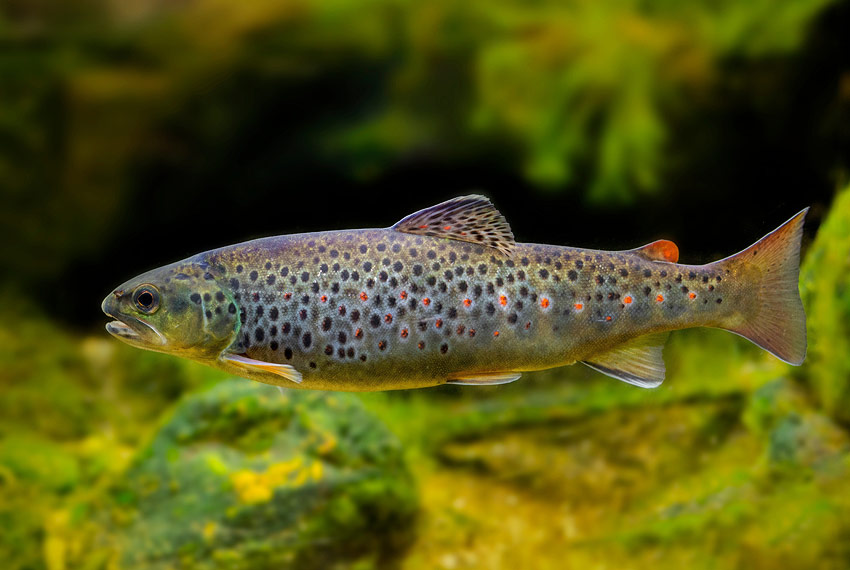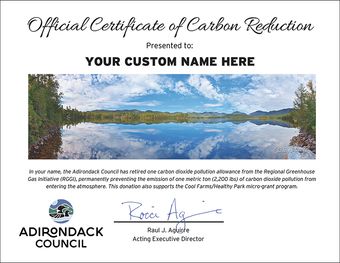What We Do
What is Mercury?
Mercury is a highly toxic element that becomes an air pollutant largely through emissions from coal-fired power plants. It is also broken free from rock and soil by acidic water. Small amounts are also contained in the same pollution that causes acid rain.

Dangers of Mercury in Ecosystems
Mercury can collect in the body tissue of fish. This build-up of mercury has major health implications not only for fish, but also other species that consume them. Birds such as loons, ducks, eagles, herons, and others consume large quantities of fish. Mammals such as fishers, bears and people are also at risk.
Specific Impacts
As annual average temperatures rise, the boundaries of the boreal forests are retreating northward toward Canada and upslope to the tops of the Adirondack Mountains. Boreal wildlife that can migrate into these retreating and shrinking boreal forests must do so or perish. Shorter winters and a lack of surface ice on Lake Champlain and the St. Lawrence River make it harder for species to move into or out of the Adirondacks from Canada and New England.

Mercury Facts
Advance the goals of the Essex Farm Institute as a program of the Adirondack Council.
Provide micro-grants for farmers and value-added business owners to enhance the economic, human and environmental resiliency of Adirondack farms.
Increase the acres of private Adirondack forest land where sustainable forestry standards or best management practices are followed.
Conserve working forests and working farmland through support for conservation easements and other programs.
Retain at least 5,000 acres of working farmland in the Champlain Valley and the greater Adirondack region.
How You Can Help
Carbon Reduction Certificate
There are several ways you can play an active role in fighting the harmful impacts of climate change on the Adirondack Park. You can take direct action to reduce total carbon emissions by purchasing a Carbon Reduction Certificate from our Cool Farms/Healthy Park Program, which helps the Adirondack Council fight climate change while curbing pollution under the Regional Greenhouse Gas Initiative and providing grants for energy efficiency to small farms and businesses. You can help us support the federal Clean Power Plan, which mandates carbon reductions from power plants nationwide. You can also help us support the vigorous implementation of the Community Risk and Resiliency Act.

Other Ways You Can Reduce Your Contribution to Climate Change
- Sign up to a green energy supplier. Many states will allow you to choose your supplier.
- Turn it off or unplug devices when not in use (lights, television, DVD player, computer) Devices draw power even when they are off. Turn off the power strip or unplug them when not in use. (The cell phone charger is good place to start).
- Turn down the heat (even a little bit helps) and use a programmable thermostat.
- Turn down the setting on your hot water heater.
- Fill your dish washer and washing machine with a full load. Wash clothes in cold water whenever possible.
- Go for a run rather than drive to the gym.
- Replace your standard light bulbs with compact fluorescent bulbs.
- Conduct an energy audit to learn where you are losing energy in your home.
- Get advice on appliances and improvements that will save energy and save you money in the long-run.
- Carpool, bike/walk, or use public transportation if possible.
- Do your weekly shopping in a single trip.
- Discuss the possibility of four day work week with your employer.
- Consider a hybrid, biodiesel, or high mileage vehicle.
- Turn off your car engine – avoid idling.
The local food movement has been energized by the realization that for most of us our food has traveled thousands of miles and used extraordinary resources to grow, raise and bring foods to market. Changing our eating habits is another way to make a difference.
- Don’t buy bottled water (especially if the bottled water is from far away) if your tap water is safe to drink.
- Grow your own fruits and vegetables.
- Buy locally raised meat, and fresh fruit and vegetables in season from local, organic growers.
- Choose foods with less packaging.
Impact of Carbon Reduction (US EPA estimates)
1 ton = amount of CO2 one acre of healthy forest removes from the air/year
3 tons = amount saved by recycling one ton of waste instead of landfilling
5 tons = average passenger car in the U.S. annual gasoline use (21.4 mpg/11,318 miles = 4.75 metric tons CO2)
7 tons = nearly one year’s worth of electricity use by the average American household
24 tons = monthly total output for average American family (all sources; energy, transportation, waste, etc.)
75 tons = tanker truck of gasoline
187 tons = rail car of coal
1.3 million tons = one coal-fired power plant (2010 emissions rates, now declining)
Resources
New York State Energy Research and Development Authority
Energy efficiency, incentives, audits, suppliers, ways to conserve.
1-866-NYSERDA or nyserda.org
Adirondack Harvest
Local farms, food sources in the Adirondacks.
adirondackharvest.com
Energy Star
Appliances, federal tax credits, house improvement.
energystar.gov
